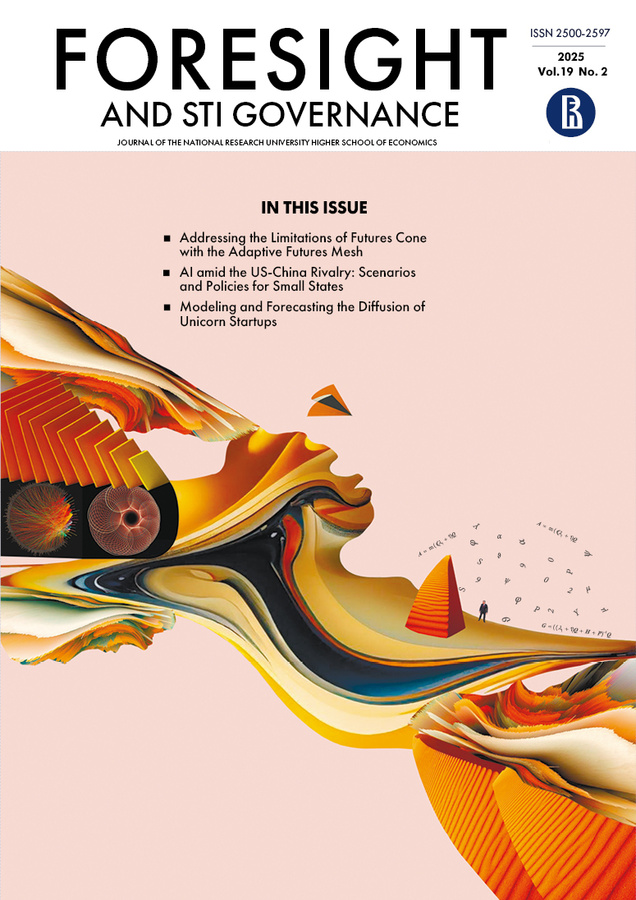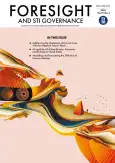The Role of Digital Leadership Capabilities in Enterprise-Wide Digital Transformation
- Authors: Goetzinger P.1, Spremić M.1, Jaković B.1
-
Affiliations:
- University of Zagreb
- Issue: Vol 19, No 2 (2025)
- Pages: 68-76
- Section: INNOVATION
- URL: https://journal-vniispk.ru/1995-459X/article/view/307346
- DOI: https://doi.org/10.17323/fstig.2025.27129
- ID: 307346
Cite item
Abstract
In a situation of rapid technological development and the world’s transition to a new technological regime, organizations are faced with the need for digital transformation (DT). This process goes beyond the simple implementation of advanced technologies and involves the management of processes of increased complexity, deep recombinations of business processes, structures, methods of external communications, and so on. However, these factors are not considered by most organizations. In other words, DT is underestimated in terms of complexity, duration, and intensity of adaptation stress. Only 10%-20% of organizations succeed in such a transformation at the first attempt, with large companies failing most often. This study analyzes the reasons why most of these initiatives fail to achieve their goals. Particular emphasis is placed on the link between digital competencies of managers and the impact of technological reforms. For this purpose, an array of relevant publications on the topic of DT over the last five years was analyzed. According to the results, the majority of organizations enter DT without proper preparation in the form of early revision of competencies and corporate culture, going beyond the established models of thinking and behavior, which previously provided competitiveness, but in the new context cease to work. Principles that increase the chances of successful digital transformation are formulated. This article contributes to the growing body of knowledge on management practices in transformational transitions.
About the authors
P. Goetzinger
University of Zagreb
Author for correspondence.
Email: alexis.colmenares@iaen.edu.ec
M. Spremić
University of Zagreb
Email: mspremic@efzg.hr
B. Jaković
University of Zagreb
Email: bjakovic@efzg.hr
References
- Al Maazmi A., Piya S., Araci Z.C. (2024) Exploring the Critical Success Factors Influencing the Outcome of Digital Transformation Initiatives in Government Organizations. Systems, 12(12), 524. https://doi.org/10.3390/systems12120524
- Aldoseri A., Al-Khalifa K.N., Hamouda A.M. (2024) AI-powered innovation in digital transformation: Key pillars and industry impact. Sustainability, 16(5), 1790. https://doi.org/10.3390/su16051790
- Ali M.M., Begum S. (2024) Case Study: Satya Nadella’s Leadership at Microsoft. IOSR Journal of Business and Management (IOSR-JBM), 26(12), 74–79.
- AlNuaimi B.K., Singh S.K., Ren S., Budhwar P., Vorobyev D. (2022) Mastering digital transformation: The nexus between leadership, agility, and digital strategy. Journal of Business Research, 145, 636–648. https://doi.org/10.1016/j.jbusres.2022.03.038
- Bharadwaj A., El-Sawy O.A., Pavlou P.A., Venkatraman N. (2013) Digital business strategy: Toward a next generation of insights. MIS Quarterly, 37, 471–482. https://doi.org/10.25300/MISQ/2013/37:2.3
- Bresciani S., Huarng K.H., Malhotra A., Ferraris A. (2021) Digital transformation as a springboard for product, process and business model innovation. Journal of Business Research, 128, 204–210. https://doi.org/10.1016/j.jbusres.2021.02.003
- Carroll N., Conboy K., Wang X. (2023) From transformation to normalisation: An exploratory study of a large-scale agile transformation. Journal of Information Technology, 38(3), 267–303. https://doi.org/10.1177/02683962231164428
- Correani A., De-Massia A., Frattini F., Petruzzelli A.M., Natalicchio A. (2020) Implementing a digital strategy: Learning from the experience of three digital transformation projects. California Management Review, 62, 37–56. https://doi.org/10.1177/0008125620934864
- Espina-Romero L., Norono-Sanchez J.G., Rojas-Cangahuala G., Palacios Garay J., Parra D.R., Rio Corredoira J. (2023) Digital Leadership in an Ever-Changing World: A Bibliometric Analysis of Trends and Challenges. Sustainability, 15(17), 13129. https://doi.org/10.3390/su151713129
- Feliciano M.M., Ameen N., Kotabe M., Paul J., Signoret M. (2023) Is digital transformation threatened? A systematic literature review of the factors influencing firms’ digital transformation and internationalization. Journal of Business Research, 157, 113546. https://doi.org/10.1016/j.jbusres.2022.113546
- Gao J., Zhang W., Guan T., Feng Q., Mardanic A. (2022) The effect of manufacturing agent heterogeneity on enterprise innovation performance and competitive advantage in the era of digital transformation. Journal of Business Research, 155, 113387. https://doi.org/10.1016/j.jbusres.2022.113387
- Haskamp T., Dremel C., Marx C., Uebernickel F. (2021) Understanding Inertia in Digital Transformation: A Literature Review and Multilevel Research Framework. Paper presented at the 42th International Conference on Information Systems (ICIS), December 2021, Austin, USA.
- Heredia J., Castillo V.M., Geldes C., Carbajal F.M.G. (2022) How do digital capabilities affect firm performance? The mediating role of technological capabilities in the “new normal”. Journal of Innovation & Knowledge, 7(2), 100171. https://doi.org/10.1016/j.jik.2022.100171
- Hinings B., Gegenhuber T., Greenwood R. (2018) Digital innovation and transformation: An institutional perspective. Information and Organization, 28, 52–61. https://doi.org/10.1016/j.infoandorg.2018.02.004
- Hussein H., Albadry O.M., Mathew V., Al-Romeedy B.S., Alsetoohy O., Abou Kamar M., Khairy H.A. (2024) Digital leadership and sustainable competitive advantage: Leveraging green absorptive capability and eco-innovation in tourism and hospitality businesses. Sustainability, 16(13), 5371. https://doi.org/10.3390/su16135371
- Jöhnk J., Oesterle S., Ollig P., Riedel L.N. (2020) The Complexity of Digital Transformation – Conceptualizing Multiple Concurrent Initiatives. In: WI2020 Zentrale Tracks (eds. C.M. König, N. Guhr, J. Svetachova, M.H. Breitner), Berlin: GITO, pp.1051–1066. https://doi.org/10.30844/wi_2020_j8-joehnk
- Karakose T., Kocabas I., Yirci R., Papadakis S., Ozdemir T.Y., Demirkol M. (2022) The development and evolution of digital leadership: A bibliometric mapping approach-based study. Sustainability, 14(23), 16171. https://doi.org/10.3390/su142316171
- Karakose T., Tülübaş T. (2023) Digital leadership and sustainable school improvement — A conceptual analysis and implications for future research. Educational Process: International Journal, 12(1), 7–18. https://doi.org/10.22521/edupij.2023.121.1
- Karippur N.A., Balaramachandran P.R. (2022) Antecedents of Effective Digital Leadership of Enterprises in Asia Pacific. Australasian Journal of Information Systems, 26, 2525. http://dx.doi.org/10.3127/ajis.v26i0.2525
- Kirti N., Rakesh D.R., Vinay S.Y., Pragati P., Balkrishna E.N. (2022) The impact of sustainable development strategy on sustainable supply chain firm performance in the digital transformation era. Business Strategy and the Environment, 31(3), 845–859. https://doi.org/10.1002/bse.2921
- Klos C., Spieth P., Clauss T., Klusmann C. (2021) Digital Transformation of Incumbent Firms: A Business Model Innovation Perspective. IEEE Transactions on Engineering Management, 99, 3075502. https://doi.org/10.1109/TEM.2021.3075502
- Kotter J.P. (1995) Leading change: Why transformation efforts fail. Harvard Business Review, May-June 1995. https://hbr.org/1995/05/leading-change-why-transformation-efforts-fail-2, accessed 11.12.2024.
- Kraus S., Durst S., Ferreira J.J., Veiga P., Kailer N., Weinmann A. (2022) Digital transformation in business and management research: An overview of the current status quo. International Journal of Information Management, 63, 102466. https://doi.org/10.1016/j.ijinfomgt.2021.102466
- Mergel I., Edelmann N., Haug N. (2019) Defining digital transformation: Results from expert interviews. Government Information Quarterly, 36(4), 101385. https://doi.org/10.1016/j.giq.2019.06.002
- Mollah M.A., Amin M.B., Debnath G.C., Hosain M.S., Rahaman M.A., Abdullah M. (2024) Nexus among digital leadership, digital transformation, and digital innovation for sustainable financial performance: Revealing the influence of environmental dynamism. Sustainability, 16(18), 8023. https://doi.org/10.3390/su16188023
- Mrugalska B., Ahmed J. (2021) Organizational Agility in Industry 4.0: A Systematic Literature Review. Sustainability, 13(15), 8272. https://doi.org/10.3390/su13158272
- Nambisan S., Wright M., Feldman M. (2019) The digital transformation of innovation and entrepreneurship: Progress, challenges and key themes. Research Policy, 48(8), 103772. https://doi.org/10.1016/j.respol.2019.03.018
- O’Brien J., Singh M., Whelan A., Manning E., Jayes F., Murphy J., Brosnan A. (2023) Unpacking Digital Transformation Risk: A Systematic Review On Why Digital Transformations Often Fail To Deliver Value. Paper presented at the 2023 European Academy of Management Conference, March 2023, Dublin, Ireland.
- Oludapo S., Carroll N., Helfert M. (2024) Why do so many digital transformations fail? A bibliometric analysis and future research agenda. Journal of Business Research, 174, 114528. https://doi.org/10.1016/j.jbusres.2024.114528
- Pagani M. (2013) Digital business strategy and value creation: Framing the dynamic cycle of control points. MIS Quarterly, 37, 617–632. https://doi.org/10.25300/MISQ/2013/37.2.13
- Peng Y., Alias B.S., Mansor A.N., Ismail M.J. (2024) Charting the evolving landscape of digital leadership in education: A systematic literature review. Journal of Infrastructure, Policy and Development, 8(8), 5925. https://doi.org/10.24294/jipd.v8i8.5925
- Piepponen A., Ritala P., Keränen J., Maijanena P. (2022) Digital transformation of the value proposition: A single case study in the media industry. Journal of Business Research, 150, 311–325. https://doi.org/10.1016/j.jbusres.2022.05.017
- Plekhanov D., Franke H., Netland T.H. (2023) Digital transformation: A review and research agenda. European Management Journal, 41(6), 821–844. https://doi.org/10.1016/j.emj.2022.09.007
- Qiao G., Li Y., Hong A. (2024) The strategic role of digital transformation: Leveraging digital leadership to enhance employee performance and organizational commitment in the digital era. Systems, 12(11), 457. https://doi.org/10.3390/systems12110457
- Qiao W., Ju Y., Dong P., Tiong R.L.K. (2024) How to realize value creation of digital transformation? A system dynamics model. Expert Systems with Applications, 244, 122667. https://doi.org/10.1016/j.eswa.2023.122667
- Ramesh N., Delen D. (2021) Digital Transformation: How to Beat the 90% Failure Rate? IEEE Engineering Management Review, 49(3), 22–25. https://doi.org/10.1109/EMR.2021.3070139
- Schiuma G., Santarsiero F., Carlucci D., Jarrar Y. (2024) Transformative leadership competencies for organizational digital transformation. Business Horizons, 67(4), 425–437. https://doi.org/10.1016/j.bushor.2024.04.004
- Teece D.J. (2007) Explicating dynamic capabilities: The nature and microfoundations of (sustainable) enterprise performance. Strategic Management Journal, 28(13), 1319–1350. https://doi.org/10.1002/smj.640
- Trenerry B., Chng S., Wang Y., Suhaila Z.S., Lim S.S., Lu H.Y., Oh P.H. (2021) Preparing Workplaces for Digital Transformation: An Integrative Review and Framework of Multi-Level Factors. Frontiers in Psychology, 12, 620766. https://doi.org/10.3389/fpsyg.2021.620766
- Trischler J., Trischler W.J. (2022) Design for experience – A public service design approach in the age of digitalization. Public Management Review, 24(8), 1251–1270. https://doi.org/10.1080/14719037.2021.1899272
- UNCTAD (2019) Digital Economy Report 2019, Geneva: United Nations.
- Veeraya S., Raman M., Gopinathan S., Singh J. (2024) Digital Business Transformation of Malaysian Small and Medium-Sized Enterprises: A Review on Digital Leadership and Digital Culture. International Journal of Organizational Leadership, 13(4), 703–721. https://doi.org/10.33844/ijol.2024.60439
- Verhoef P.C., Broekhuizen T., Bart Y., Bhattacharya A., Dong J.Q., Fabian N., Haenlein M. (2021) Digital transformation: A multidisciplinary reflection and research agenda. Journal of Business Research, 122, 889–901. https://doi.org/10.1016/j.jbusres.2019.09.022
- Wang L., Jin X., Yoo J.J. (2024) The process of visionary leadership increases innovative performance among IT industry 4.0 for SMEs for organizational sustainability: Testing the moderated mediation model. Sustainability, 16(19), 8690. https://doi.org/10.3390/su16198690
- Zhang H., Ding H., Xiao J. (2023) How organizational agility promotes digital transformation: An empirical study. Sustainability, 15(14), 11304. https://doi.org/10.3390/su151411304
- Zhu X., Ge S., Wang N. (2021) Digital transformation: A systematic literature review. Computers & Industrial Engineering, 162, 107774, 10.1016/j.cie.2021.107774
Supplementary files









